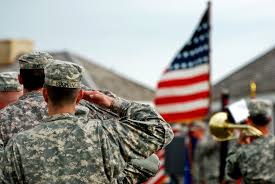Partners Of Gay Soldiers Bid Farewell In Secret
Military Deployment Puts Unique Pressure on Gay Couples
SANTA BARBARA, CA, – When the love of his life prepared to leave home for deployment to the Middle East just days after Valentine’s Day, J.R. packed a bible, a rosary and the St. Michaels medal, symbol of the patron saint of the warrior. “We talked for over an hour that night,” J.R. recalled. “I said, if you ever get scared, you talk to the big man upstairs. He’ll listen and He’ll take care of you.”
But as families from across the nation traveled to Fort Bragg, North Carolina to hug and pray for their personal heroes from the 82nd Airborne, J.R. sat at home alone. He and his partner are gay, and the ban on openly gay soldiers in the military makes a teary good-bye an impossible risk at the moment when, by all accounts, it is needed most.
It is hard to imagine what a 20-year-old soldier feels when facing deployment for war. Besides contemplating the unimaginable loss of life or limb, he must confront the possibility of killing another human being, the prospect of profound physical discomfort from harsh weather and hostile terrain, and the loss of leaving loved ones behind.
But most can at least talk about whom they’ll miss back home. For gay soldiers, this is not an option, because the military’s ten-year-old “don’t ask, don’t tell” policy prohibits gay and bisexual soldiers from saying anything which would reveal their sexuality. And so, as couples and families throughout America engage in a classic—and often very public—wartime separation ritual, gay soldiers show up for departure alone, sometimes forced to spin wild tales to explain the absence of significant others to bid them farewell.
J.R., who insisted his full name not be used to protect his partner’s identity, and W.F., whose partner was deployed to Kuwait in January from Good Fellow Air Force Base in San Angelo, Texas, agreed recently to speak with researchers at the Center for the Study of Sexual Minorities in the Military (CSSMM), a think tank at the University of California, Santa Barbara, that studies gay troops.
It is impossible to know how many gay soldiers currently serve in the U.S. military. Aaron Belkin, Director of CSSMM, says a conservative estimate is 60,000, but the number could be much higher. According to Steve Ralls, Director of Communications at the Servicemembers Legal Defense Network (SLDN), a legal aid and advocacy group that supports gay soldiers, his staff has received an increase in calls from concerned service members since mobilization began. SLDN now receives up to twenty-five calls each week from soldiers concerned about how to stay in touch with their partners, how to select same-gender individuals for benefits and emergency notification, how to report harassment and how to respond to investigations of their sexuality.
The calls coming into SLDN are a reminder that abiding by “don’t ask, don’t tell” requires much more of gays than simply remaining quiet about their sexual orientation. Elaborate charades must often be carried out just to ensure that suspicions do not arise. “If a straight soldier gets a letter from his girlfriend,” says J.R., “he can tell his buddies, pass the letter around, show them pictures. If you’re gay or bi, you can’t. If you get a letter or photo, you rip it up or burn it; you can’t keep it.” Before W.F. saw his partner off, he was told to strip his letters of any hints that the two were involved. “Writing him letters, I have to be sort of careful what I say,” he explained. “I have to be reserved and act like we’re just good friends.” Though W.F.’s partner is out to nearly his entire platoon, letters to and from deployed soldiers are often screened, so gay soldiers face discharge if they are honest in even their most intimate correspondences.
For this reason, J.R. has helped his partner establish a sophisticated cover for his homosexuality during deployment. After explaining away a hickey by fabricating dates with women, they had to make up stories to carry the fiction overseas. “It would be very unusual for him to see girls every week and then not get any letters,” says J.R. So two female friends have offered to help write letters, to lend their names, photos, even their handwriting (as a conservative American male, J.R. says, his handwriting is clearly a male’s) to their effort to delude comrades and superiors into thinking he is heterosexual. The team just sent off its first fabricated letter.
But it is not only discharge that J.R.’s partner faces if the truth is revealed. He also faces violence. “In the 82nd,” J.R. explains, “if it gets out, you’re going to get beat up. That threat is always there because of the amount of homophobic remarks made in the barracks.” Last year, SLDN reported that both gay discharges and reports of anti-gay harassment reached record levels. In 2001, the latest year for which figures are available, 1250 troops were fired for being gay, lesbian or bisexual and 1075 complaints of anti-gay harassment were reported.
For many, all this is a slap in the face to the brave men and women who are willing to defend their country to the death. “If he can die for his country,” says J.R., “he should be able to hug the person he loves and say good-bye, just like all the other soldiers do. But we had to say good-bye in private and behind closed doors; no emotion can be shown or you can be court-marshaled.”
In the meantime, J.R. has hung a flag in his living room in honor of his partner. The American Legion has made the flags available with blue stars representing active service members. And he prays for him every day. “What I pray for is for him to come home, to come home safely and unharmed, and for his fellow soldiers to come home safely and unharmed also.
